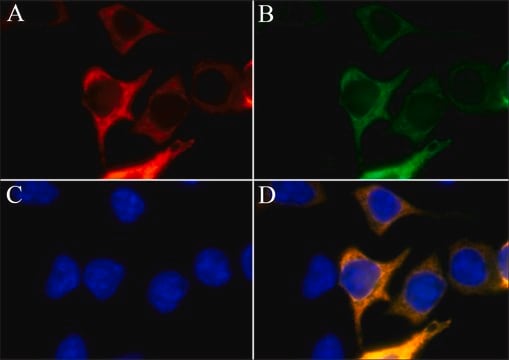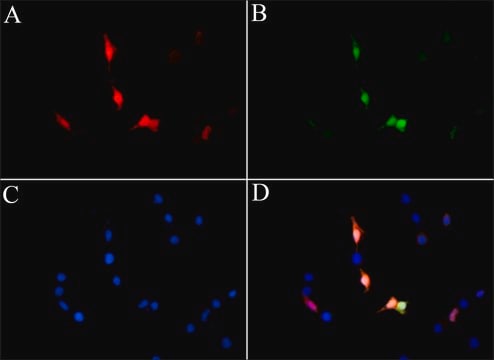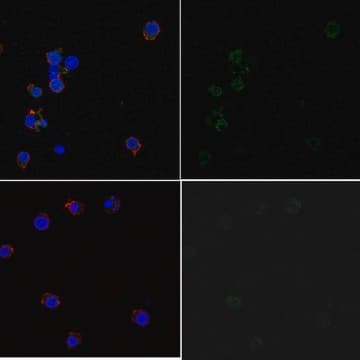MABE1824
Anti-LbCpf1 Antibody, clone 2D5-6G11
clone 2D5-6G11, from mouse
Synonym(s):
Cpf1
Sign Into View Organizational & Contract Pricing
All Photos(2)
About This Item
UNSPSC Code:
12352203
eCl@ss:
32160702
NACRES:
NA.43
Recommended Products
biological source
mouse
antibody form
purified immunoglobulin
antibody product type
primary antibodies
clone
2D5-6G11, monoclonal
species reactivity
Lachnospiraceae, bacteria
packaging
antibody small pack of 25 μg
technique(s)
western blot: suitable
isotype
IgG1κ
target post-translational modification
unmodified
Related Categories
General description
CRISPR-associated endonuclease Cas12a (UniProt: A0A182DWE3; also known as CRISPR-associated endonuclease Cpf1; Lbcpf1) is a single crRNA-guided endonuclease of the class 2 CRISPR-Cas system that lacks tracrRNA and undergoes large conformational changes upon crRNA binding. Cpf1 has several features that can distinguish it from Cas9. Unlike Cas9 that uses dual-guide RNAs, Cpf1 is guided by a crRNA. It recognizes a T-rich PAM (T-rich protospacer adjacent motif), whereas Cas9 favors a G-rich PAM and Cpf1 generates staggered ends at its PAM-distal region, but Cas9 creates blunt ends at its PAM-proximal region. Cpf1 displays higher targeting specificity in mammalian cells when compared to Cas9. It has been shown that depending on the PAM sequences, LbCpf1 can undergo conformational changes to form altered interactions with the PAM-containing DNA duplexes, hence achieving the relaxed PAM recognition. (Ref.: Zetsche, B., et al. (2015). Cell 163(3); 759-77; Yamano, T., et al. (2017). Mol. Cell 67(4); 633-645; Gao, P., et al. (2016). Cell Res. 26(8); 901-913).
Specificity
Clone 2D5-6G11 specifically detects CRISPR-associated endonuclease Cas12a (LbCpf1).
Immunogen
Epitope: N-terminus
His-tagged recombinant fragment from the N-terminal region of Lachnospiracea bacteria.
Application
Anti-LbCpf1, clone 2D5-6G11 Antibody, Cat. No. MABE1824, is a highly specific mouse monoclonal antibody that targets LbCpf1 and has been tested for use in Western Blotting.
Research Category
Epigenetics & Nuclear Function
Epigenetics & Nuclear Function
Western Blotting Analysis: Various dilutions from a representative lot detected LbCpf1 in lysates from HEK293 cells expressing HA-tagged LbCpf1 (Courtesy of Stefan Schuchner, Ph.D. and Egon Ogris, M.D., Medical University of Vienna, Austria).
Quality
Evaluated by Western Blotting in HEK293 cells expressing HA-tagged LbCpf1.
Western Blotting Analysis: 1 µg/mL of this antibody detected LbCpf1 in lysate from HEK293 cells expressing HA-tagged LbCpf1.
Western Blotting Analysis: 1 µg/mL of this antibody detected LbCpf1 in lysate from HEK293 cells expressing HA-tagged LbCpf1.
Target description
~144 kDa observed; 143.03 kDa calculated. Uncharacterized bands may be observed in some lysate(s).
Physical form
Format: Purified
Protein G purified
Purified mouse monoclonal antibody IgG1 in buffer containing 0.1 M Tris-Glycine (pH 7.4), 150 mM NaCl with 0.05% sodium azide.
Storage and Stability
Stable for 1 year at 2-8°C from date of receipt.
Other Notes
Concentration: Please refer to lot specific datasheet.
Disclaimer
Unless otherwise stated in our catalog or other company documentation accompanying the product(s), our products are intended for research use only and are not to be used for any other purpose, which includes but is not limited to, unauthorized commercial uses, in vitro diagnostic uses, ex vivo or in vivo therapeutic uses or any type of consumption or application to humans or animals.
Not finding the right product?
Try our Product Selector Tool.
Storage Class Code
12 - Non Combustible Liquids
WGK
WGK 1
Flash Point(F)
Not applicable
Flash Point(C)
Not applicable
Certificates of Analysis (COA)
Search for Certificates of Analysis (COA) by entering the products Lot/Batch Number. Lot and Batch Numbers can be found on a product’s label following the words ‘Lot’ or ‘Batch’.
Already Own This Product?
Find documentation for the products that you have recently purchased in the Document Library.
Audrey M V Ah-Fong et al.
Molecular plant pathology, 22(6), 737-752 (2021-03-17)
Phytophthora infestans is a destructive pathogen of potato and a model for investigations of oomycete biology. The successful application of a CRISPR gene editing system to P. infestans is so far unreported. We discovered that it is difficult to express CRISPR/Cas9
Our team of scientists has experience in all areas of research including Life Science, Material Science, Chemical Synthesis, Chromatography, Analytical and many others.
Contact Technical Service







